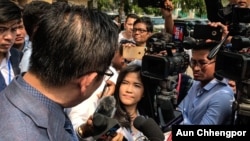During a live broadcast and under the watchful eyes of dozens of other journalists, I tried to stay strong as Cambodia's prime minister, Hun Sen, reacted to my question—one no other reporter had dared ask.
In an extended back and forth, Hun Sen said VOA twisted the news and asked me to swear on my life that my questions weren't planted. Throughout the exchange, I expected security to escort me from the briefing.
The prime minister's accusations were nothing new. Many government officials have accused me of working for foreigners to destroy peace in Cambodia.
Nonetheless, I kept smiling and I kept asking questions.
When I started as a stringer reporter for the VOA Khmer language service in August 2016 it was to contribute to independent reporting without fear or favor.
I am proud to be a journalist even at a time when press freedom in Cambodia is under restraint. Since 2017, conditions for the press have deteriorated with journalists arrested or harassed, and news outlets forced to close. New laws have further restricted the space for criticism.
Some journalists have warned me not to "push the button too hard" to avoid getting in trouble. I don't know if they told me that in good will or as a threat.
Government officials have used the way U.S. President Donald Trump verbally attacks journalists, saying they could chase us out of the conference room if we ask questions they think are not good for them.
But the independent press has an important role, even when under pressure.
Some local media organizations rely on outlets like VOA to ask questions they hesitate to ask, either to avoid accusations of being anti-government, losing their job or causing trouble for their publication.
State media often do not dare cover sensitive stories like VOA does. Sometimes they choose to attack VOA when the government reacts to our reporting.
For instance, if a government official accuses VOA reporters of "selling their head"—working for the benefit of a foreign government—some pro-government media will accuse VOA of being part of a U.S. government plot that is against Cambodia. (VOA is funded by Congress but works independently.)
This was the case when video of my April 7 exchange with Hun Sen was broadcast live on his Facebook page.
After partly answering my question about the state of emergency draft law, the prime minister asked me to swear on my life if I'd been asked by someone in Washington to ask the question.
My answer was simple: I work independently, and people in (Washington,) D.C. don't dictate to me how I do my work. As a journalist, I know what questions to ask. In this instance, I simply did basic research, as the text of draft law had been available through social media.
As the live-video streamed and remained available online, supporters of the government and ruling party attacked and insulted me via social media.
Swearing on my life that I am reporting independently and factually is fine, but the insults and attacks for standing up for press freedom are hard. Several people have told me I should be careful.
Challenges to reporting
Since a media crackdown in 2017, VOA Khmer has been one of the key sources of verified and accurate news for approximately 15 million Cambodians.
Gathering important news can be a challenge when access to information and officials is restricted, and where asking a tough question, especially on human rights issues, can lead to silence or even jail.
Any questions deemed sensitive by government officials are mostly turned down or unanswered. Some civil society leaders and citizens decline interviews because of pressure.
Some said they were scared not only of arrest but also that they may be attacked. Some worried that talking to the press could impact their business and livelihoods.
Journalists also risk abuse or arrest for covering these topics. Journalism is not a crime, as the saying goes. But it could be should power rest in the hands of a corrupt elite.
Every day I experience these challenges, as do other independent journalists in Cambodia.
When I conduct an interview in a public place or coffee shop, I often spot someone eavesdropping or taking my picture. When I cover a protest, I sometimes see police or others taking photos to document the faces of those who attended, presumably to send to their superiors.
I have had officials deny me access to information because I work for independent media, or verbally harass me when I ask questions at a press conference. This has happened also to other reporters, including those from VOA's Khmer Service.
When I anchor a Facebook live stream, bots—or fake accounts—have posted insulting and hateful comments about me.
Despite these challenges, the few independent reporters in Cambodia remain committed to reporting the news
Because, without a free press, people will never know the truth about their society.
[Editor's note: VOA Khmer is just one of 47 language services providing independent journalism around the world.]




